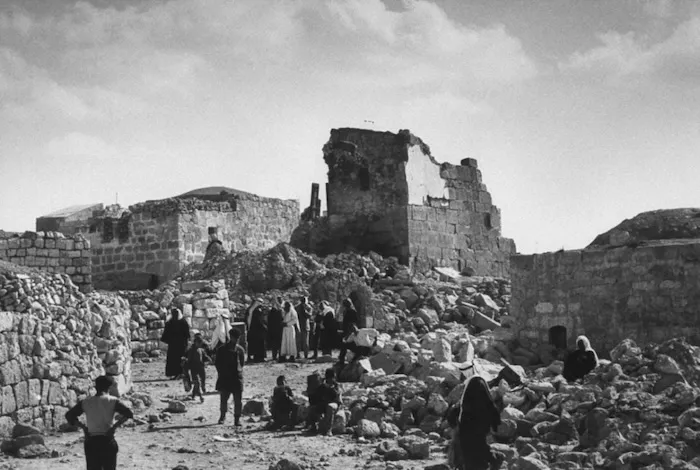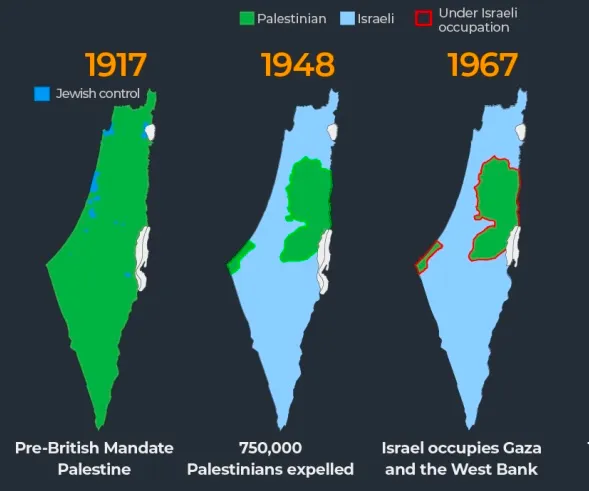1967 Israeli-Arab War
The 1967 Israeli War, often referred to as the Naksa (lit. ‘setback’), was a pivotal event that significantly reshaped the geopolitical landscape of the Middle East. This conflict, lasting only six days, led to Israel’s occupation of the remaining Palestinian territories, along with parts of Egypt and Syria, fundamentally altering the course of the region’s history.
Prelude to war
Section titled “Prelude to war”To understand the 1967 war, we must revisit the war of 1948. The war saw the establishment of Israel and the displacement of a large Palestinian population and left Israel in control of a significant portion of historical Palestine, with the rest under Egyptian and Jordanian administration.
The Israeli leaders saw the 1948 war as a missed chance to take over all of historical Palestine, from the Jordan River to the Mediterranean Sea. They held back only because of a deal with Jordan, made in the last days of British rule. This pact limited Jordan’s military role in the 1948 Arab war. In exchange, Jordan got to annex what became the West Bank. David Ben-Gurion, maintaining this pre-1948 agreement, later described the decision to let Jordan have the West Bank as a lasting regret, or “bechiya ledoro”. Israeli historian, Ilan Pape, writes:
Israeli Massacres
Section titled “Israeli Massacres” 1953: Palestinian villagers returning after the Qibya Massacre
1953: Palestinian villagers returning after the Qibya Massacre
In October 1953, Zionist forces led by Ariel Sharon (who would later become a future Israeli Prime Minister) attacked Qibya, a Palestinian village, in the then Jordan-controlled West Bank. The operation saw the destruction of forty-five houses, a school, and a mosque. The Israeli Government claimed this massacre was response to cross-border incursions from the West Bank where an Israeli woman and her children were killed. The Israeli assault resulted in the deaths of over sixty-nine Palestinians, mostly women and children.
A further pivotal event prior to the war was the Israeli military attack against the West Bank village of As Samu. These incidents, along with disputes over the use of Jordan River water and Israeli cultivation along the border, heightened animosities between Israel and its neighbors.
Arab Armies Defeated
Section titled “Arab Armies Defeated”The immediate catalyst for the war was the false warning by the Soviet Union to Egypt about Israel’s troop movements towards Syria. This misinformation led Egypt to demand the evacuation of UN troops from Sinai, and subsequently, it blocked Israeli shipping in the Red Sea.
The war commenced with a Israeli then launched an attack on Egypt’s airbases, crippling the Egyptian Air Force and gaining a substantial military advantage. Israel then rapidly expanded its offensive against Jordan and Syria, capturing the West Bank, East Jerusalem, the Gaza Strip, the Golan Heights, and the Sinai Peninsula.
Israeli Occupation
Section titled “Israeli Occupation”Israel had realised its long standing territorial ambition to expand its reach further into the Palestinian enclaves of Gaza, West Bank and the major prize of total control of Jerusalem. This expansion brought more than a million Palestinians under direct Israeli control, drastically changing the demographic and political realities of the region.
The aftermath of the war had profound impacts on Palestinian people. The war resulted in further displacement and the onset of Zionist military occupation, exacerbating the already dire refugee crisis. It also spurred the emergence of armed resistance movements among Palestinians, reshaping their approach to the conflict.
For Israel, the war was seen as a significant victory and led to a surge increased settlement activities in the occupied Palestinian territories. This expansion was in direct contravention of international law and marked the beginning of a prolonged and contentious issue of illegal Israeli settlements on Palestinian land.
 Zionist occupation of Palestine. Source: Al Jazeera
Zionist occupation of Palestine. Source: Al Jazeera
